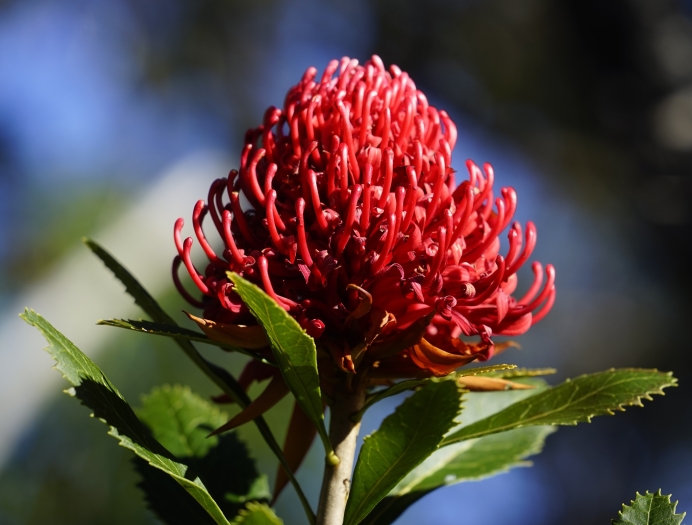Waratah
(Telopea speciosissima)
Waratah (Telopea speciosissima)
/
/

Tim
CC BY 4.0
Image By:
Tim
Recorded By:
Copyright:
CC BY 4.0
Copyright Notice:
Photo by: Tim | License Type: CC BY 4.0 | License URL: http://creativecommons.org/licenses/by/4.0/ | Rights Holder: Tim | Publisher: iNaturalist | Date Created: 2020-09-07T15:20:41-07:00 |





















































Estimated Native Range
Summary
Telopea speciosissima, commonly known as Waratah, is an evergreen shrub native to the sclerophyll forests and coastal scrublands of New South Wales, Australia. It typically grows to a height of 2-9 feet (0.6-2.7 meters) and a width of 5-8 feet (1.5-2.4 meters). The Waratah is renowned for its large, striking red flowers that bloom in spring, which are very showy and can be up to 4 inches (10 cm) in diameter. These flowers are composed of numerous small florets and are surrounded by colorful bracts, making them a focal point in any garden. The plant’s leathery, dark green leaves add to its visual appeal.
Waratah is valued for its spectacular flowers and as a source of nectar for birds. It is used in ornamental plantings, as a feature shrub, and for cut flowers due to its long-lasting blooms. In cultivation, Waratah requires well-drained, acidic to neutral soil and benefits from a sheltered position to protect the blooms from wind. It prefers full sun to part shade and needs low amounts of water once established, making it suitable for gardens with dry climates. After the flowering period, heavy pruning encourages bushier growth and more abundant flowering in the following season. While the species can be grown from seed, cultivars should be propagated from cuttings to maintain their distinct characteristics. Potential problems include root rot in poorly drained soils and susceptibility to Phytophthora cinnamomi. It is not considered invasive outside its native range.CC BY-SA 4.0
Waratah is valued for its spectacular flowers and as a source of nectar for birds. It is used in ornamental plantings, as a feature shrub, and for cut flowers due to its long-lasting blooms. In cultivation, Waratah requires well-drained, acidic to neutral soil and benefits from a sheltered position to protect the blooms from wind. It prefers full sun to part shade and needs low amounts of water once established, making it suitable for gardens with dry climates. After the flowering period, heavy pruning encourages bushier growth and more abundant flowering in the following season. While the species can be grown from seed, cultivars should be propagated from cuttings to maintain their distinct characteristics. Potential problems include root rot in poorly drained soils and susceptibility to Phytophthora cinnamomi. It is not considered invasive outside its native range.CC BY-SA 4.0
Plant Description
- Plant Type: Shrub
- Height: 6-12 feet
- Width: 5-8 feet
- Growth Rate: Moderate
- Flower Color: Red
- Flowering Season: Spring
- Leaf Retention: Evergreen
Growth Requirements
- Sun: Full Sun, Part Shade
- Water: Low
- Drainage: Medium, Fast
Common Uses
Salt Tolerant, Showy Flowers
Natural Habitat
Sclerophyll forests and coastal scrublands
Other Names
Common Names: New South Wales Waratah, Telopea
Scientific Names: , Telopea speciosissima, Embothrium spathulatum, Embothrium speciosissimum, Embothrium speciossimum, Embothrium speciosum, Hylogyne spathulata, Hylogyne speciosa,
GBIF Accepted Name: Telopea speciosissima (Sm.) R.Br.